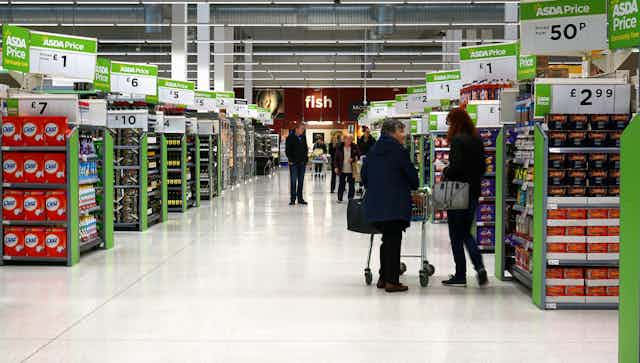Fifty years ago then-prime minister Harold Wilson made the decision to devalue the pound in a bid to tackle the UK’s flagging economy. Overnight the government changed the value of the pound from US$2.80 to US$2.40 – a 14% drop.
Today, the UK government is beset with a similar issue. Although, this time the fall in the pound is not entirely of its own making – it is a consequence of the Brexit vote. Nonetheless, since the UK’s decision to leave the EU, sterling has dropped 14% against the currencies that the UK trades the most with.
This is having some serious knock-on effects on the UK economy. So far, attention has focused on the big uptick in inflation that it has caused. The key measure, CPI (the consumer prices index), has been rising since the Brexit vote (although it remained unchanged in July thanks to falling fuel prices offsetting a rise in food, clothing and other household goods).
A much bigger issue is how the fall in sterling will affect household and private sector spending in the longer-term. And central to this lies the uncertainty that a confused government bestows upon the UK economy.
Inflation is a cause of harmful uncertainty in the economy and it even acts as a hidden tax if HMRC tax brackets are not updated regularly. It also reduces the real disposable income of households, making the pound in your pocket feel less valuable.
But the level of inflation the UK is experiencing is far from catastrophic. If seen historically, it is still rather on the low side. Average inflation in the last 60 years has been around 5.5%. In the last 20 years, when fighting inflation became a priority for the UK government, the figure has been around 2.6%.
In fact, the official mission of the Bank of England is not to eliminate inflation but to keep it around 2%. A reason for this is that a low level of inflation is thought to stimulate the economy. It means consumers are buying things, businesses investing and there’s a healthy supply of affordable credit from the banking sector – all important contributors to economic growth.
This is not the case in the UK, however. The reason behind the recent rise in inflation is the fall of the pound in relation to other major currencies.
As the exchange rate of the pound falls, UK firms pay more pounds to purchase the same goods from abroad. And the UK imports a lot. This increase in wholesale import prices takes months to find its way into high street retail prices as businesses slowly renegotiate contracts with their suppliers and customers. In a recent report, the Bank of England highlights the falling pound as the reason for inflation and estimates that it will peak at 3%, in October 2017.
Cliff edge?
Once the process of passing import costs onto customers is complete, the main driver of inflation will have been eliminated – prices will be higher but stable. My estimate is that at that point inflation will start a long and dangerous downward spiral, propelled by the underlying weakness of the UK economy.
Deflation means that prices in an economy fall and, although this may at first sound appealing, it poses a grave economic danger. When prices fall, households and businesses postpone investment and spending, hoping to buy these cheaper later. Yet, an economy that shies away from consumption and investment will soon fall into recession, triggering further price falls. With this comes unemployment, reduced revenues for businesses and fewer taxes for the government. This is what happened to Japan in the 1990s and resulted in one of the highest government debts in the world.
The potential for deflation is evident in the UK. Despite record employment, wage growth has been anaemic, and even the government’s optimistic officials warn that Brexit will have a negative long-term impact on disposable income and business opportunities. This will hit consumer spending, one of the three pillars of the UK economy. The other two are real estate and financial services – both of which have looked dicey since the Brexit vote.
What’s worse, inflation follows not just the real data but our expectations for the data to come. For example, if you believe that London real estate prices will fall, you will refrain from buying and wait. If this belief is widespread then demand for properties will collapse, actually turning into reality what was initially only a speculation. This process aggravates the lack of expenditure that the data indicates.
Brexit is casting a spell of negative expectations on the UK economy. The future of the financial services industry, real-estate worries, losing millions of EU workers and concerns for more expensive trade are all suppressing our confidence – which then further dampens the economy.
At this stage the actions of the UK government are critical. Yet, Theresa May has thus far failed to make a convincing argument that the impact of Brexit on the economy will be minimal.

